
Credit: Canva
Dental Flossing Reduces Risk Of Stroke, Heart Diseases: Study
A recent report published by the Centers for Disease Control and Prevention (CDC), showed that Cardiovascular disease (CVD), including heart strokes, topped the list of diseases linked to deaths across America. This prompted the health authorities to teach people about the benefits of exercise and a healthy diet. Now, scientists have claimed that another lesser-known gadget—dental floss—can benefit you equally.
What Is Flossing?
Flossing is a key part of oral hygiene, but research suggests it may also play a role in heart and brain health. A new study presented at the American Stroke Association’s International Stroke Conference 2025 found that regular flossing is linked to a significantly lower risk of stroke and atrial fibrillation (AFib). Experts explain that while gum disease and cavities are known risk factors for stroke and heart attack, recent findings suggest that flossing specifically lowers stroke risk. Additionally, a higher frequency of flossing appeared to further reduce this risk.What Was The Research About?
Researchers analyzed data from over 6,000 participants in a long-term study on heart health. The study examined lifestyle factors influencing atherosclerosis, a condition involving artery narrowing. The research team focused on the impact of flossing, independent of other oral health habits like brushing and dentist visits, on cardiovascular health. About 65% of participants reported flossing. Over a 25-year follow-up period, 434 individuals experienced strokes, 97 of which were cardioembolic strokes—caused by blood clots travelling from the heart to the brain.Flossing was associated with a 22% lower risk of ischemic stroke and a 44% lower risk of cardioembolic stroke. Additionally, those who flossed had a 12% reduced risk of atrial fibrillation, a condition that can lead to stroke. Health experts acknowledge the study’s findings but caution that self-reported data has limitations. It’s possible that people who floss also engage in other heart-healthy behaviours, which could influence the results. The exact mechanism behind flossing's impact on stroke risk isn’t fully understood, but inflammation appears to play a key role.
Health professionals explain that poor oral health contributes to inflammation and artery hardening, increasing stroke risk. Flossing may help by reducing oral infections and inflammation while promoting other healthy habits. Additionally, research presented at the conference highlighted a potential link between oral bacteria and stroke. Scientists found that stroke survivors had higher levels of Streptococcus Anginosus, a bacteria commonly found in the mouth and gut. Its presence was associated with increased stroke risk and worse outcomes.
Other Ways To Prevent Stroke
Making lifestyle changes can significantly reduce the risk. According to the American Heart Association (AHA), to lower the risk of CVD, you can take the following steps:- Eating a healthier diet
- Increasing physical activity
- Quitting tobacco
- Getting sufficient sleep
- Maintaining a healthy weight
- Controlling cholesterol
- Managing blood sugar
- Regulating blood pressure.
© 2024 Bennett, Coleman & Company Limited

